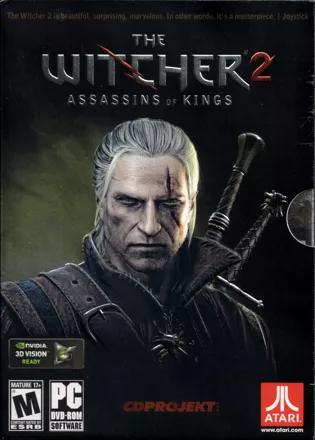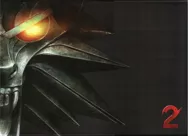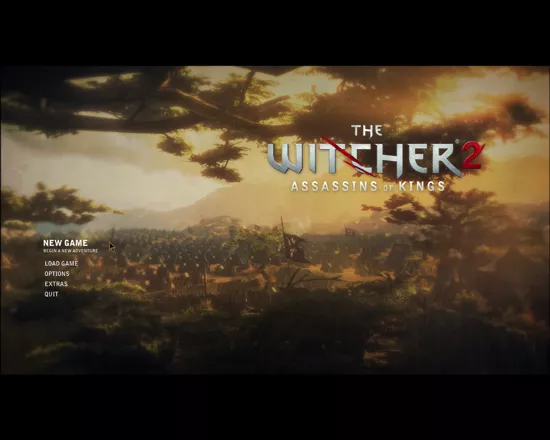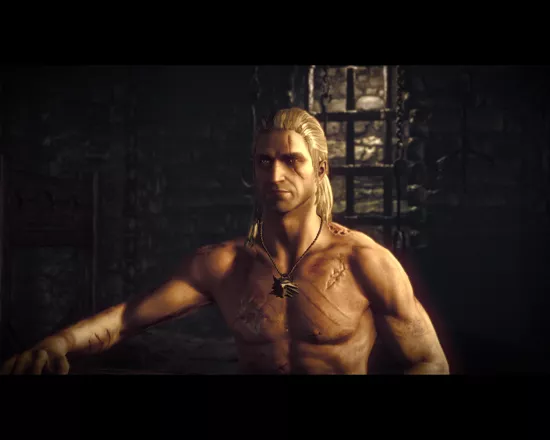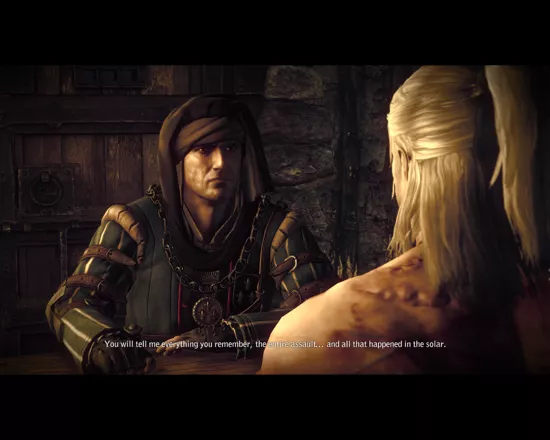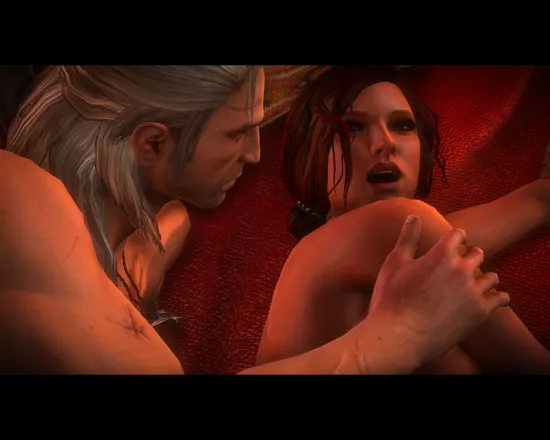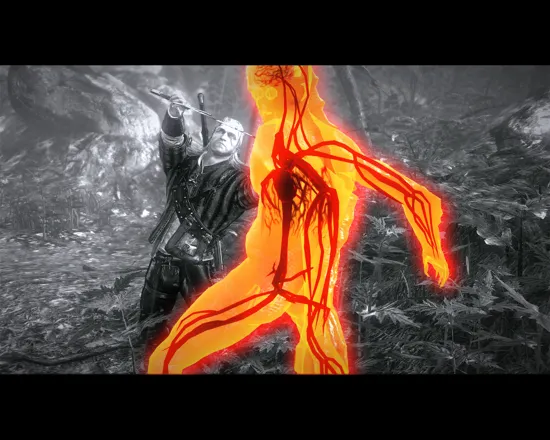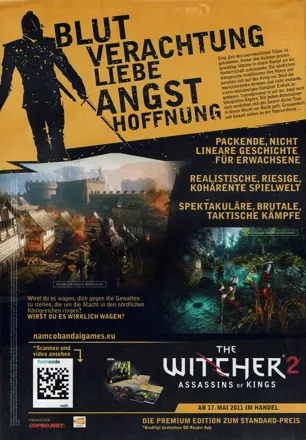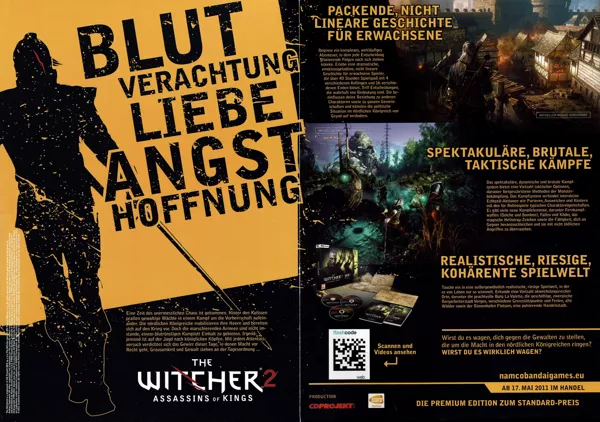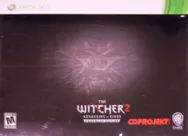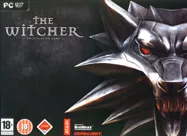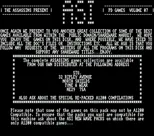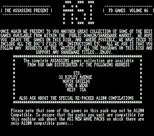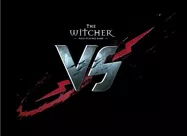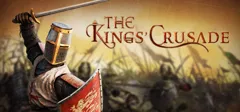The Witcher 2: Assassins of Kings
Description official descriptions
Geralt of Rivia saved King Foltest from an unknown assassin at the end of the first game. One month later, he is locked in the dungeons pending execution for a crime he didn't commit. Somehow he must convince his jailers of his innocence and be allowed to hunt down the real Kingslayer. Teaming up with a high-ranking official of Temeria, Geralt conducts his own investigation and is shocked to discover that the mysterious killer is, in all probability, a witcher just like himself.
The Witcher 2: Assassins of Kings is a single-person role-playing game in which the player takes control of Geralt the Witcher in third-person view. The fantasy world of the game is dark, and so are its evils - murder, kidnapping, torture, racism, rape, corruption and prostitution. Politics are complex, and decisions made by those in power can cause kingdoms to fall at any moment. There are monsters that stalk through the sewers and streets, forests and hills, caves and crypts. As one of the few remaining witchers, Geralt's skills are sought by many, and he will face more than atypical foes, each with its own attack methods, strengths and weaknesses. Quests can be solved in different ways, and ethical decisions made will effect which one of the sixteen different endings the player receives.
Geralt fights alone using steel and silver swords with the aid of his magical Signs. Additional tactics are possible with thrown weapons (daggers and bombs) or by placing traps in strategic locations. Time of the day as well as the weather can influence the effectiveness of Geralt's combat techniques. The game abandons the timed combo-based battle system of its predecessor, following a simpler action combat style, including light and strong attacks, blocking, parrying, and dodging. The sequel introduces more types of weapons and heavier armor management. Four difficulty modes are available at the start of a new game (Easy, Normal, Hard or Insane) but can be changed within the game.
Collecting components and reagents is necessary for the alchemy and crafting elements of the game. Pilfering items is unhindered since any chest, barrel or furnishings can be searched without repercussions. Geralt must have the appropriate diagram or formula in inventory to concoct potions and bombs, or to have an item crafted by a merchant. Some weapons contain expansion slots for the addition of magical runes. Armor can be improved with type-specific enhancements. Once endowed, the rune or addition is permanent.
Quick Time Events may appear from time to time and are handled differently depending upon the activity. During fist fights, for instance, the player must press specific keyboard keys quickly as they appear on the screen. In arm wrestling and during certain scenario-specific events, a mouse button must be pressed rapidly or held down when prompted to do so. QTEs are also used in some of the boss battles.
The newly-designed skill tree is divided into four sections, Training, Swordsmanship, Alchemy and Magic, the latter three unlocked after the first is completed. As in the first game, Geralt receives "talent points" when gaining a level; these can be distributed freely by the player to learn and enhance his abilities and skills. New enhancement mutagens can be added to specific abilities at the end of each section of the skill tree.
All versions of the game, released in both DVD and Digital file formats, contain items in addition to the game itself and the manual:* Trailers, developer diaries, gameplay footage, interviews and "making of" video
- Soundtrack
- World Map
- Game Guide
- Papercrafts
- Pamphlet
- Coin, Envelope (retail version only)
- Free download for DLC content (for owners who register their game)
Spellings
- Ведьмак 2: Убийцы королей - Russian spelling
- 巫師2:王國刺客 - Traditional Chinese spelling
Groups +
- Fantasy creatures: Dragons
- Fantasy creatures: Dwarves
- Fantasy creatures: Elves
- Gameplay feature: Alchemy
- Gameplay feature: Brothels
- Gameplay feature: Character development - Skill distribution
- Gameplay feature: Gambling
- Gameplay feature: Importable characters
- Gameplay feature: Multiple endings
- Gameplay feature: Optional permadeath / permanent death
- Middleware: Nvidia 3D Vision
- Nudity
- The Witcher licensees
- The Witcher series
- Theme: Amnesia
- Xbox 360 Classics releases
Screenshots
Promos
Videos
See any errors or missing info for this game?
You can submit a correction, contribute trivia, add to a game group, add a related site or alternate title.
Credits (Windows version)
373 People (343 developers, 30 thanks) · View all
| The Witcher 2 Game is based on the prose of | |
| Game Director | |
| Lead Story and Dialogue Designer | |
| Lead Quest Designer | |
| Lead Gameplay Designer | |
| Lead Combat Designer | |
| Lead Programmer | |
| Technical Director | |
| Lead Concept Artist | |
| Lead Environment Artist | |
| Lead Character Artist | |
| Lead Cutscene Artist | |
| Lead Producer | |
| Lead Tester | |
| Localization Producer | |
| Story Producer | |
| Design Producer | |
| Art Producer | |
| Technical Producer | |
| Story Design and Dialogue | |
| Quest Design | |
| [ full credits ] | |
Reviews
Critics
Average score: 89% (based on 118 ratings)
Players
Average score: 4.1 out of 5 (based on 50 ratings with 2 reviews)
I can discuss politics and women all day long, but swimming is still a mystery to me
The Good
When the original Witcher was released in 2007, it quickly gained a cult following among RPG fans, mainly thanks to its mature narrative and the moral choices it presented to the players. The sequel continues to push these concepts forward, and once again, they are revealed as the game's most appealing side.
The word "mature" has been incessantly abused by everyone when referring to video game content; it has been firmly associated in our brains with naked female bosoms and severed monster limbs. While The Witcher 2 spares no effort in depicting precisely these anatomical details (particularly the former), it also understands the idea of maturity a bit more seriously than other games. Instead of simply throwing sex scenes at the player, it is not afraid of openly discussing sexual topics that have been largely absent from mainstream games.
Just like in the first game, the world of The Witcher 2 is marked by unabashed sexism, and many of its characters are driven by primitive passions, often tainted by violence. To its credit, the game never uses rape as gratuitous material for sexual stimulation (which is often the case in many fringe products by deranged Japanese developers). Instances of rape are part of the game's story, but it certainly doesn't dwell on them; they serve as a macabre illustration to the society it depicts.
Political ambitions, racial intolerance, and other important themes are also treated in a truly mature way in the game. Perhaps The Witcher 2 can be described as too dark, persistently emphasizing egotism, greed, and violent tendencies in most of its main characters; but it succeeds in painting a sinister world that serves as a (mostly) convincing counterpart to naive romanticized depictions of European Middle Ages-like scenarios prevalent in most other games. The Witcher 2 is mature in the best sense of this word; it challenges the player with its serious topics, showing that video games can be thought-provoking without resorting to cheap sensational gimmicks.
Deliberately avoiding clear black-and-white alternatives, the game compels the player to ponder every decision he makes. Many of the choices are quite tough, including the principal story-branching decision (siding with Roche or Iorveth), which essentially splits the second third of the game into two completely different chapters. As in the first game, trying to find some sort of guidance, some principles to adhere to in this gloomy world, provides a good role-playing experience, the player constantly struggling with his own choices rather than following formulaic "light" or "dark" paths.
While the first Witcher suffered from translation inadequacies, the second one seems to be impeccable. The writing is excellent, with bits of dark, sarcastic humor interspersed through the conversations; each sentence is cleverly built, each phrase is poignant. Even the most mundane dialogues contain something interesting; I founded myself looking forward to yet another wise, cynical remark by Geralt that would spice up every conversation he takes part in. The English voice acting is, for the most part, clearly above average.
The Witcher 2 addresses some of the gameplay features that were poorly developed in the original. The most evident improvement is the much heavier equipment management. There are many more weapons and various types of armor in the sequel than in its predecessors. It is worth the while to find or purchase stronger swords or heavier armor; browsing the wares of every merchant will often reward the player with an unexpectedly good item. Crafting system is very interesting and well-executed; hunting for raw ingredients becomes one of the most addictive activities in the game, and nothing compares with the joy of finding that piece of silver ore that will finally allow Geralt to don a shiny new chainmail.
The game boasts beautiful graphics that ooze charm and atmosphere. Particularly the outdoor areas are full of typically Slavic poetic melancholy that softens the game's overall brooding tone, casting an enchanting light on its delightfully simple images of Eastern European nature.
The Bad
Exploration has always been an important part of Western role-playing game mechanics. Paradoxically, as the technical quality of graphics grew, the size of game worlds began to decline. The few true open-world RPGs of late (e.g. Gothic 3) were distinguished by bland writing and dull narratives. This changed when Fallout: New Vegas proved that a huge, fully explorable environment could co-exist with cleverly written dialogues and memorable characters. Before New Vegas, I discreetly craved for such a combination; after New Vegas, I openly demand it. Unfortunately, The Witcher 2 clearly represents only one side of the deal: the writing. Its world is a collection of artificial paths created with the sole purpose of advancing the game's story.
It is particularly distressing that a game which tells a fairly complex story full of grand conflicts between kingdoms and political intrigues reduces itself to a paltry collection of two or three small towns. Worse, the outdoor areas are composed of infuriating arbitrary borders that hinder exploration and significantly lower the immersion in the game world. When I behold a lofty mountain, I want to climb it and enjoy a breathtaking view. When I see a river glistening under the sun, I want to swim in it. When I encounter a log on my way, I want to jump over it. Why is Geralt unable to perform these simple activities? Why does he inexplicably refuse to stray from his pre-determined way? Why do I have to tread on boring roads to reach a space that should be clearly accessible by simple walking? Why create such wonderful graphics only to degrade them to a mere background status, preventing the player from properly interacting with them?
I wasn't at all excited by the combat system in The Witcher 2. Regardless of its flaws, I found the elegant combo-based system of the first game more attractive. The sequel does little to enhance the meager combat-related character development possibilities of the first game; just like before, it's all about being a swordsman and nothing else. Magic is used for supportive purposes only; it pays off to increase some of the spells, but the actual battles invariably boil down to basic hack-and-slash. Combat feels rather messy and is ultimately unsatisfying. Also, experience bestowed to the player upon vanquishing the foes pales in comparison with the hefty chunks received for automatically completing main quests. Higher experience awarded for side quests, as well as a larger quantity of those, would have been very helpful; side quests in The Witcher 2 are only few and far between.
A personal writing-related quibble of mine regards the prodigious amounts of sexual expressions in the game's conversations. I realize they wanted to present a harsh, repelling medieval life driven by earthly desires, but I feel they went over the top with that. Vulgarisms are natural when uttered by guards, but they do not behoove monarchs and representatives of nobility. It makes a strange impression when a king finds it appropriate to discuss a woman's body when talking to an ambassador. Nearly every female character in the game is object to crude jokes and coarse descriptions by the game's characters. Judging by Witcher 2, it seems that the European nobles were nothing but a bunch of whoring, drinking male chauvinist pigs. It is entirely possible that many of them indeed possessed those traits - but were they really so eager to admit it?..
The Bottom Line
Much like the other two modern-day RPG blockbusters, The Witcher 2 has left me with contradicting emotions. Loving the writing and the mature themes, I couldn't help being disappointed by the way it functioned as a game. The Witcher 2 is surely a worthy follower to its illustrious predecessor; it has soul and charisma, which is what ultimately matters. But neither its world nor its gameplay mechanics made a lasting impression on me. Am I too impertinent to wish for a story-driven RPG with physical interaction and open environments? Or maybe modern RPG developers could learn something from Fallout: New Vegas?..
Windows · by Unicorn Lynx (181577) · 2016
A terrific sequel that continues Geralt's story and leads us into the next chapter
The Good
Version played: GOG European release, English, patched to v1.2 (1st play) & then 2.1
CPU: Pentium 5, Intel Core 2 Quad Q9550 2.83Ghz
OS: Windows XP Pro SP3
RAM: 3.25GB
Video Card: 1GB GeForce 9800GTX+
Story
The main objective in The Witcher 2 is to hunt down and destroy the "kingslayer" who assassinated King Foltest, or so we're lead to believe in the beginning. Like all great stories, there is much more to it, influenced by intricate layers of political and moral motives. We must make decisions based upon available information as well as our own feelings. This leads to even more branching story threads than in the first game, and ultimately to one of the sixteen endings. Even what appears to be the most insignificant dialog selection can lead you down an entirely different path. Those decisions may (or may not) effect the end-game, but most definitely will have an impact on future happenings. Playing through multiple times and making different choices is the only way to see the game in its entirety. Fantastic!
World
Three chapters, three locations - and, again, never the need (or option) to go back to previous areas. That's just the way it is. Those who prefer a wide open, free-roaming world might not like it, but it works in this game.
Each location is open to you, though, and there's plenty to do. Take on as few or as many side quests as you like. There are castles, towns, forests and caves to be explored; conversations to have with NPCs and transactions to conduct. Diversions exist too including playing dice poker, competing in arm-wrestling and fist-fighting, or spending a few hours collecting reagents for making potions, bombs or to use in crafting.
Combat
Combat in general is much improved, although I missed the special attacks from the first game. Use of the WASD keys plus the mouse is more akin to other games in this genre. The responsiveness of the keyboard wasn't always perfect in my case, which I chalked up to lulls affected by long play periods. Usually it was better after deleting a chunk of older saved games or starting after a fresh system boot.
So many other RPGS base their monsters on the Lord of the Rings, but there are none of them here, and it's a refreshing change. (You'll find no orcs in this game!) In addition to human and elf opponents, I was impressed by the sheer number (and types) of unique monsters. They are intelligent, cunning and ruthless monsters that swoop down from above, spring up out of the ground, and chase after you with unrelenting speed. They have vicious teeth, claws or tentacles, and some spew noxious gasses at you.
Character Relationships
Love relationships take a back seat in this game compared to the first Witcher. After his stint in prison, Geralt gets sexual relief with Triss, yes, but afterwards the conversation is casual and without commitment. The lack of "love" interests disappointed me at first, but later I realized why the developers wanted Geralt to go down a different path. We eventually learn that Yennefer, his sorceress wife, previously presumed dead, may be alive. It stands to reason that no other relationship can be nurtured until the mystery of Yennefer is solved, although it's obvious that Geralt and Triss care deeply for each other.
Graphics & Sound
Without a doubt, Witcher 2 is a beautiful game with lush and engaging graphics. It's obvious that time and care were taken while designing each and every graphic aspect. All characters are unique in look, actions, voice and personality. The buildings and forests looked and felt very realistic to me. Geralt is still as sexy and manly as before. All of the women look gorgeous, with and without their clothes.
The game sports an original, orchestrated musical score that is both pleasant to listen to as well as unobtrusive. Sound effects help with the immersion factor. There are special sounds to warn you when a fight is imminent, for instance. Each of the monsters has its own, unique battle sounds too.
The Bad
Game Design Issues
My particular preferences for RPGs may be different than yours, so you may not agree with my assessments below. These need improvement in my opinion.
- Inventory: Again, the inventory is unsorted so finding things is tedious. The items are put into categories, true, but placed there in the order you acquire them. Being able to sort them alphabetically, by weight and/or price would enhance this area.
- Buying and Selling: First of all, what you have equipped is not visible in the buy/sell screen making it impossible to compare items. Secondly, you sell items for pennies although the same item is worth an unreasonable ten times more in a merchant's store. Thirdly, there aren't enough merchants in each location.
- Crafting: I think the entire crafting system in Witcher is outdated. After Geralt purchases the proper diagram for a piece of armor or a weapon, why not allow him to create it himself? That would mean you could craft something even while out in the wilderness. There are also some inconsistencies in object names. For instance, the diagram for Solid Cloth actually makes Robust Cloth. This is true for at least one potion too .. the formula called "Whirl" makes "Healing Potion".
- Journal/Knowledge base: Information about monsters is included in 2 separate areas (the Journal and in the Character section). Why not put them together?
- Exploration: You can't go through the bushes or over a hill, even though it might look like a viable pathway.
Other Comments
Making a game challenging with seemingly unbeatable enemies has its merits. However, if a player can't seem to move on, the ensuing frustration may result in uninstalling the game rather than finishing it. That happened to me in several spots during Witcher 2. Sometimes reasoning out strategies helped, while other times I had to change the difficulty setting back a notch. However, some problems were not my fault and were instead the result of lulls in the engine and/or lack of keyboard responsiveness during action-rich sequences.
The manual could have included more information about the new mutagens and how/when to apply them.
Although patch 2.1 added storage at each of the inns, there's still an issue with Geralt's weight limit. The storage helps, but we're still constantly having to decide what to keep and what to get rid of (by dropping or selling). I was disappointed in the final chapter when I hadn't saved one component for a powerful sword or piece of armor that would finish a quest. I don't know if I used it in a potion or sold it, and of course it could not be found anywhere in that area. How was I to know?
Glitches (still present after patch 2.1):
The ESC key didn't work sometimes. This was a show stopper.
When trying to restore a game, I was dropped back to the Launcher unexpectedly. This happened pretty often, and was only fixed by deleting 75% of my old saved games.
The Bottom Line
The CD Project Red team obviously put their hearts and souls into The Witcher 2: Assassins of Kings, and improvements over the first game are evident. I, therefore, wholeheartedly recommend this to all fans of the RPG genre.
This is a decidedly different game than its predecessor and does a very good job of continuing the tale of Geralt of Rivia, the phenomenally talented monster-slayer. Since Geralt's memory is not yet fully recovered, and he still doesn't know what became of his wife, Yennefer, this game leads us right into another chapter, which hopefully will not be too long in coming.
Windows · by Jeanne (75814) · 2012
Discussion
| Subject | By | Date |
|---|---|---|
| Who's playing Witcher 2? | Jeanne (75814) | Jul 3, 2011 |
Trivia
Added Game Modes/Settings (Patch v2.0)
- Arena
This is a new gameplay mode that is separate from the main adventure and narrative of The Witcher 2. In this mode, Geralt of Rivia duels a variety of foes to the death in a gladiatorial arena located in an unnamed town somewhere in the Northern Kingdoms. In addition to winning gold and valuable items, players also receive points for their wins. They can then post their point totals on-line to compare their achievements against those of other blood sport enthusiasts around the world. Geralt can encounter both foes and allies in the arena. He can recruit the latter for a fee to assist him during his most challenging clashes. To post your point totals to the forum, you must be registered and have a forum account! Register and establish your account directly through the game launcher or go to www.thewitcher.com. You can then log in to your account via the launcher.
IMPORTANT: Players using mods to alter their character attributes and statistics will not be able to post their point totals from the Arena to the server. This is a necessary precaution to prevent any attempts at distorting competition or misrepresenting player achievements.
* Tutorial
The game tutorial takes the form of a brief adventure during which players learn how to use a range of game mechanics and functionalities. Assuming the role of game protagonist Geralt of Rivia, players save a wounded knight named Bolton of Ironford while learning game controls as well as the basics of combat and alchemy. This transpires step by step as the tutorial guides players through a series of minor missions. Upon completion, based on demonstrated abilities, the tutorial recommends the difficulty level which the player should choose in embarking on the main adventure of The Witcher 2.
* Dark Difficulty
The ‘Dark’ difficulty setting is the most demanding difficulty level in gameplay terms. Under this setting, each and every foe represents a significant challenge. In addition to raising the difficulty bar, the module includes several new sets of equipment/items that are linked through a dark legend detailed in the Journal. Once all their components have been collected and donned, the Blasphemer’s, Oathbreaker’s and Kinslayer’s outfits provide great advantages in combat. The swords included in the outfits strip opponents of Vitality while supplementing the witcher’s. However, given that they are cursed, the swords provide no benefit and harm Geralt by sapping him of Vitality as long as the outfits to which they belong remain incomplete.
Amendments to the Game Manual (English)
- Page 9, Map panel – the map can also be scrolled using the mouse (LMB + mouse move) or the keyboard cursor keys.
- Page 10, Key binding - you can also custom bind keys using the configuration tool built into the game launcher.
- Page 27, Bombs – the ‘Beehive’ bomb should be labeled the ‘Grapeshot’ bomb as this is the name used for the weapon in the game.
- Page 31, Quick casting Signs - Signs can also be quick cast by pressing the following: 5 for Aard, 6 for Yrden, 7 for Igni, 8 for Quen, 9 for Axii.
DLC Content (included in patches)
Equipment (available in inventory at the beginning of the game): * Blue Stripes Combat Jacket * Ultimate Alchemist's Outfit * Ultimate Mage's Outfit * Ultimate Swordsman's Outfit
Scenarios/Quests:* “Finisher Pack” – bonus finishers available from the beginning of the game * “Mysterious Merchant” - character who can first be encountered in the harbor in Chapter 1 of the game and then in all other game chapters * “Troll Trouble” - start this quest by finding the relevant notice on the notice board in Chapter 1 of the game. Look for the troll just outside of Flotsam, by the ruined bridge in the forest. * “Barbers and Coiffeuses” - for a small fee, Geralt can get some merchants to change his hairstyle. Search the notice boards. * "A Sackful of Fluff" is an additional quest in Chapter 2 of the game. To start the quest, visit the eccentric Elthon, who inhabits a solitary hut near the quarry outside Vergen.
Legal
After CD Projekt RED announced that THQ would distribute The Witcher 2 on the Xbox 360, Namco Bandai filed a lawsuit against the developer (announced on July 7, 2011). Namco Bandai also alleged in the suit that CD Projekt RED had breached their contract when it removed DRM protection without their knowledge.
In response to the lawsuit Adam Kicinski, CEO of CD Projekt RED, said:
"As with most cases, we first tried to end the dispute peacefully. Attempts failed and because of this, we hoped that our partner would send the case to the court. The agreement that we signed last year, concerned only the distribution of “The Witcher 2? for the PC. The records were carefully clarified to avoid any ambiguity.
Namco Bandai have options when choosing the priority of our distributor’s version of the Xbox 360. It could use, but not taken advantage of certain preferences. In this situation, we chose the offer that THQ made us.
Our financial situation is very good at the moment and the lack of a few million does not have any impact on current activities. Withholding of payments means only that after some time, our partner will have to give us the money.
I hope that the whole thing will end with a pre-litigation settlement. If it doesn’t, I am sure that we will win the case and then the loser will pay for our lawyers."
Dec 8, 2011: The ruling was in favor of Namco Bandai as the European distributor for the Xbox360 port due out in 2012.
Awards
- GameSpy
- 2011 – PC Exclusive of the Year
- GameStar (Germany)
- 2011 - #2 RPG of the Year (Readers' Vote)
- PC Games (Germany)
- Issue 01/2012 - #2 Best RPG in 2011 (Readers' Choice)
- Issue 01/2012 - #3 Best Collector's Edition in 2011 (Readers' Choice)
- Issue 01/2012 - #5 Best Game in 2011 (Readers' Choice)
Analytics
Related Sites +
-
UHS hint file for The Witcher 2
gradual hints to help you with the game at your own pace
Identifiers +
Contribute
Are you familiar with this game? Help document and preserve this entry in video game history! If your contribution is approved, you will earn points and be credited as a contributor.
Contributors to this Entry
Game added by Jeanne.
Additional contributors: JRK, Kabushi, Paulus18950, Patrick Bregger, Olga Puzikova.
Game added May 26, 2011. Last modified October 21, 2024.


